The University of Oxford primarily admits students for the Michaelmas Term (October intake) each year. For undergraduate study, applications must be submitted via UCAS by 15 October for entry the following year. Most shortlisted candidates are interviewed in December, with final decisions released in January. Admission is highly competitive, with roughly 23,000 applicants for around 3,300 places annually.
Postgraduate application deadlines vary by programme, though most taught and research courses have deadlines in December or January. Prospective students are strongly advised to apply early to be considered for University and departmental scholarships. Decisions are typically communicated 8–10 weeks after the deadline. Oxford does not operate quotas for international students; admissions are strictly merit-based.
The Oxford Saïd MBA follows a staged admissions process, with multiple rounds running until mid-March. Applicants are generally expected to have a minimum of two years’ work experience, a strong undergraduate degree, competitive GMAT or GRE scores, and robust supporting materials.
Check University of Oxford Rankings, Scholarships & Popular Courses
Reddit Insights for Indian Students:
- Accepted Qualifications: CBSE and CISCE are accepted; other boards are considered on a case-by-case basis. NIOS is generally not accepted.
- Financial Considerations: Oxford admissions are attainable for applicants from non-elite institutions or middle-class backgrounds, though scholarships are often necessary due to high costs.
Oxford University Acceptance Rate
Oxford University’s overall undergraduate acceptance rate is generally around 13-14%, meaning roughly 1 in every 6–7 applicants is offered and accepts a place. As per 2020–2024 reports:
| Year | UK (%) | EU (%) | Non-EU / International (%) |
|---|---|---|---|
| 2024 | 17.8 | 6.9 | 7.7 |
| 2023 | 17.5 | 7.6 | 7.7 |
| 2022 | 17.8 | 6.9 | 7.4 |
| 2021 | 18.7 | 6.0 | 6.1 |
| 2020 | 20.9 | 9.7 | 7.3 |
Interpretation:
- UK applicants consistently have the highest acceptance rates.
- EU acceptance has declined post-Brexit (from 9.7% in 2020 to 6.9% in 2024).
- Acceptance rate for international applicants remains competitive (~6–8%).
Graduate Admissions
While domicile-specific acceptance rates are not published for graduate courses, the application distribution shows strong international representation:
| Domicile | Applications | % of Total |
|---|---|---|
| UK | 9,707 | 25.7% |
| EU | 3,572 | 9.5% |
| Non-EU | 24,434 | 64.8% |
| Total | 37,713 | 100% |
Note: Offers and admits by domicile are not publicly released, so exact graduate acceptance rates cannot be calculated.
Oxford University Postgraduate Admissions
Oxford's graduate programs include taught master's (1–2 years) and research degrees like DPhil (3–4 years). About two-thirds of graduate students are international, with Indians forming a large cohort.
Eligibility and Academic Requirements
A bachelor's degree from a recognized Indian university is required. For most courses:
- First-class or strong upper second-class honours (GPA 3.5–3.8/4.0, or 70%+ from top institutions like IITs/IIMs).
- For research degrees, a relevant master's is often needed.
Below is a table for popular PG courses:
| Course | Minimum GPA/Percentage Requirements (for Indian Students) | Application Deadline (2026-27 entry, starting Oct 2026) | Tentative Next Cycle Deadline (2027-28 entry) | Additional Requirements |
|---|---|---|---|---|
| MSc Advanced Computer Science | 70%+ or GPA 3.7+/4.0; strong programming preferred | 8 January 2026 | Early January 2027 | Higher-level English; CV; transcripts; 3 references; statement |
| MSc Financial Economics | 70-75%+ or GPA 3.5+/4.0, preferably in economics/finance | Stage 1 - 24 October 2025 Stage 2 - 7 January 2026 Stage 3 - 4 March 2026 |
September 2026–March 2027 (staged) | GMAT/GRE recommended; Kira video; essays; 3 references |
| MSc Social Data Science | 70%+ or GPA 3.5+/4.0; programming/social sciences familiarity | 9 January 2026 | November 2026 / January 2027 | Higher-level English; quantitative skills statement |
| MSc Mathematical and Computational Finance | 75%+ or GPA 3.7+/4.0 from top institutions | 28 January 2026 | November 2026 / January 2027 | Strong quant background; GRE/GMAT optional; C++ experience |
| MSc Law and Finance | 70%+ or GPA 3.5+/4.0 | 28 January 2026 | Late January 2027 | Legal background essential; GRE possible; written work |
| MPhil Economics | 75%+ or GPA 3.7+/4.0; strong quant skills | 27 January 2026 (scholarships); 3 March 2026 (final, upcoming) | Late January / March 2027 | GRE required; advanced economics; 3 references |
| MSc Pharmacology | 70%+ or GPA 3.5+/4.0 in biology/chemistry | Open (main passed; places remain) | December 2026 / January 2027 | Science background; possible interview; research preferred |
Check all PG courses at Oxford University
Notes on Eligibility Equivalents for Indian Students:
Oxford assesses Indian bachelor's degrees case-by-case, favouring higher marks from reputable institutions (e.g., IITs, Delhi University). General translations from Oxford's international qualifications guidance:
- First-class undergraduate degree (most courses) → Typically 70%+ overall, or GPA 3.7+/4.0 (higher for competitive/quant courses like 75%+).
- Strong upper second-class → Around 60-69%, or GPA 3.5+/4.0.
- For law-specific courses (e.g., MSc Law and Finance) → Outstanding performance in a law degree. (Being in the top 5–10% of your class is often considered “outstanding.”)
- English proficiency (higher level: IELTS 7.5 overall, 7.0 per component) required unless waived for English-medium degree.
Note for Indian Students: From Reddit insights, Indian applicants from non-elite colleges can succeed if GPA is high and profile includes work/research experience. For quant-heavy courses, strong GRE/GMAT scores help offset any perceived institutional bias.
How to Apply for PG Courses at Oxford University?
- Choose Course and College: Use Oxford's course finder.
- Online Application: Direct via Oxford's portal—submit CV, transcripts, 3 references, statement/research proposal, and samples.
- Interviews: For some courses.
- Decision: 8–10 weeks post-deadline.
- Fee: £75 (waivers available for low-income countries like India).
An ATAS certificate may be needed for science/tech fields.
Note for Indian Students: Reddit users note ATAS delays for Indians in STEM—apply early.
PG Deadlines for 2027/28 Entry
Applications open in September 2026. Deadlines vary (2–3 rounds per course). Apply by January for funding.
| Event | Deadline |
|---|---|
| Applications Open | September 2026 |
| Early Deadlines (for Scholarships) | December 2026 / January 2027 |
| Later Rounds | March 2027 |
| Rolling Admissions (if places remain) | Varies by course |
- Oxford conditional offers are strict.
- Missing academic conditions often lead to automatic rejection
- English conditions may be negotiable; academic ones are rarely.
- CBSE/CISCE re-evaluation delays are not always accommodated
Check out the difference between a Conditional & Unconditional Offer Letter
MBA at Oxford
Oxford's 1-year MBA at Saïd Business School is designed for professionals seeking leadership roles, with a focus on global business and entrepreneurship. It's highly selective, attracting diverse cohorts (about 30% international, including many Indians).
Eligibility and Requirements
- Academic: Undergraduate degree with first-class or strong upper second (GPA 3.5+/4.0 or 70%+ from Indian universities).
- Work Experience: Minimum 2 years, but average is 5-6 years full-time.
- Tests: GMAT (median 650-700) or GRE (160+ quant/verbal); IELTS 7.5 or TOEFL 110.
- Other: Essays, CV, 2 references (professional/academic), interview if shortlisted.
Indian applicants should highlight international experience or leadership in their essays.
Note for Indian Students: Reddit discussions point out that, as Indians, competitive GMAT scores (700+) are vital due to high applicant pools from India. Work experience in consulting/tech boosts chances.
Check out GMAT 2026 Exam Dates
Application Process
- Apply online with a fee of £150.
- Rounds: 3-4 per year.
- The process includes application review, interview (behavioural/case-based), and a decision.
Oxford University MBA Deadlines for 2027/28 Entry
| Round | Deadline | Decision By |
|---|---|---|
| Round 1 | September 2026 | November 2026 |
| Round 2 | January 2027 | March 2027 |
| Round 3 | March 2027 | May 2027 |
| Round 4 (if available) | May 2027 | June 2027 |
Note for Indian Students: Experiences on Reddit warn of post-MBA job challenges in UK due to visa rules—aim for global roles. Network via Indian alumni groups.
Check a list of top MBA universities in UK for Indian Students
Oxford University Undergraduate Admissions
Undergraduate programs at Oxford last 3–4 years and emphasise independent learning.
Eligibility and Academic Requirements
Below is a table for popular UG courses along with eligibility requirements for Indian students:
| Course | Simplified Eligibility for Indian Students (CBSE/CISCE Class XII) | Specific Prerequisites |
|---|---|---|
| Medicine (leading to BM BCh) | 90%+ overall, with 95%+ in 4 subjects and 85%+ in 1 (for AAA equivalent) | Chemistry + one of Biology/Maths/Physics; UCAT/BMAT test |
| English Language and Literature (BA) | 90%+ overall, with 95%+ in 2 subjects and 85%+ in 3 (for AAA) | English Literature or English Language & Literature |
| Computer Science (BA/MCompSci) | 90%+ overall, with 95%+ in 3 subjects and 85%+ in 2 (for A*AA) | Mathematics; Further Maths recommended; MAT test |
| Economics and Management (BA) | 90%+ overall, with 95%+ in 3 subjects and 85%+ in 2 (for A*AA) | Mathematics |
| Engineering Science (MEng) - Integrated Course | 90%+ overall, with 95%+ in 4 subjects and 85%+ in 1 (for AAA) | Mathematics + Physics; Further Maths useful; PAT test |
- Qualifications: Only CBSE and CISCE Class 12 are fully accepted; most other boards (e.g., state boards, NIOS) are not.
- Grades: Very high marks (typically ~95%+) in relevant subjects, equivalent to A-level offers.
- Predicted grades: Self-reported on UCAS; final results must meet the conditional offer.
- PAT: 2-hour online test for Engineering Science/Physics; maths and physics problem-solving.
- MAT: 2.5-hour online test for Computer Science/Maths; mathematical reasoning and problem-solving.
- UCAT: 2-hour aptitude test for Medicine; taken July–September.
- Interviews: All shortlisted candidates are interviewed (usually online for internationals).
Check Out: UCAS Deadlines
Note for Indian Students: Reddit users stress that 95%+ in boards is often necessary for shortlisting, especially in relevant subjects. Practice admissions tests extensively, as they weigh heavily.
How to Apply to UG Courses at Oxford?
- Choose Course and College: Select one course (no majors/minors) and a college, or opt for an open application.
- UCAS Application: Submit via UCAS (www.ucas.com), including a personal statement (4,000 characters) highlighting your passion and a teacher reference.
- Admissions Tests: Register for course-specific tests (e.g., MAT for Maths, LNAT for Law) via Pearson VUE.
- Written Work: Submit if required (e.g., essays for Humanities).
- Interviews: If shortlisted (based on UCAS and test scores), attend online interviews in December—prepare for academic discussions.
- Decision: Conditional offer if successful; meet grades to confirm.
Application fee: £27.50 via UCAS.
Oxford UG Deadlines for 2027 Entry
| Milestone | Deadline |
|---|---|
| UCAS Application Opens | Early September 2026 |
| UCAS Final Deadline | 6 PM BST, October 15, 2026 |
| Admissions Test Registration | Varies (typically August–September 2026) |
| Admissions Tests | October 2026 |
| Written Work Submission | November 10, 2026 |
| Interviews | December 2026 |
| Decisions | January 2027 |
Note for Indian Students: Reddit threads highlight that missing deadlines is common due to time zone confusion—submit early. Also, prepare for interviews.
Acceptance Rates
Oxford's overall undergraduate acceptance rate is about 17%, but for international students, it's lower at 7–9%. For Indian students, it's even more competitive, ranging from 2–7% (e.g., 3.9% based on recent data with ~1,800 applications and low admissions).
Oxford English Language Proficiency Requirements
If English is not your first language, you must meet Oxford’s English Language Proficiency (ELP) standards. Tests may be waived in some cases, but UKVI visa rules still apply.
| Test | Standard Level | Higher Level |
|---|---|---|
| IELTS Academic | 7.0 overall (min 6.5 each component) | 7.5 overall (min 7.0 each component) |
| TOEFL iBT | 100 overall (L22, R24, S25, W24) | 110 overall (same minimum subscores) |
Some courses (e.g., Law) require the Higher level.
- Test scores are not required at the application stage.
- If offered a place, submit scores by 31 July (or as specified).
- Tests must be taken within 2 years of the course start.
English Language Waivers:
Waivers may be granted if any of the following apply:
- At least 3 years of recent education entirely taught in English (school or degree).
- A degree-level qualification completed fully in English.
- 18+ months of recent professional experience requiring English proficiency.
Tips for Success as an Indian Applicant
- Start Early: Build a strong profile with extracurriculars, research, or internships aligned to your course.
- Personal Statement: Be specific—discuss books, projects, or ideas that excite you.
- Prepare for Tests/Interviews: Practice past papers; interviews test thinking, not knowledge.
- Visa Prep: Secure a student visa post-offer; Oxford issues CAS.
- Realism: With low acceptance rates, have backups like Cambridge or US universities.
College Choice Strategy (UG & PG)
Oxford admission is decided by the academic department first; college assignment comes afterwards. College choice rarely affects acceptance but can influence funding, scholarships, accommodation, and the student environment, especially for postgraduates.UG Courses
- College choice has minimal effect on academic admission chances
- Open application pools your application among colleges
- Colleges differ in:
- Accommodation quality
- Support
- Financial aid
Postgraduate & DPhil (VERY IMPORTANT)
- Colleges differ hugely in:
- Funding availability
- Supervisor strength
- International student proportion
- Some colleges are significantly more competitive due to funding concentration
Tip for Indians: College choice affects funding more than admission—choose strategically, not randomly.
Oxford University Scholarships and Funding
Oxford admissions and funding are closely linked, especially for postgraduate and DPhil applicants. Many academically qualified candidates are rejected or waitlisted due to funding limitations.
- Clarendon Fund – Fully funded (tuition + living); automatic consideration if you apply by the January funding deadline
- Weidenfeld-Hoffmann Scholarships – Leadership-focused; separate statement required
- Reach Oxford Scholarship – UG only; for students from low-income countries (India eligible)
- Ertegun Graduate Scholarship – Humanities & Social Sciences
- College-specific scholarships – Vary by college; funding strength differs significantly
Reddit consensus: Scholarships exist, but don’t assume admission guarantees funding — strong academics and achievements are essential.
Check: Oxford University Scholarships for Indian Students
Applying to Oxford from India requires great preparation. By meeting requirements, hitting deadlines, and showcasing your unique perspective, you can stand out among a competitive pool.
FAQs
Ques. Can I apply to Oxford with a gap year or after starting a degree in India?
Ans. Gap years are accepted and common—use the time for relevant experiences (e.g., internships or test prep) and explain it positively in your personal statement. However, Oxford does not allow transfers or credit from prior university studies; you must apply as a fresh undergraduate.
Ques. How important are extracurriculars, and what type should I prioritise?
Ans. Oxford prioritises academic ability and subject passion over general extracurriculars. Activities only matter if "supercurricular" and directly linked to your course (e.g., olympiads for STEM, debating for Law, independent research/projects). Highlight these in your personal statement to show deep engagement—generic clubs or sports add little value.
Ques. What are Oxford interviews like, and how should I prepare as an international applicant?
Ans. Interviews are academic discussions testing your thinking and problem-solving, not memorised facts. Expect subject-specific questions (e.g., unseen problems or texts). For Indians, they're usually online in December. Prepare by reviewing your application, practising past questions from course pages, and doing mock interviews—focus on thinking aloud clearly and showing enthusiasm.
College Student Profiles
University of Oxford Program Fees & Deadlines
| Program | Important Dates | Fees | Application Fees | Eligibility | Financial Aid |
|---|---|---|---|---|---|
MBA 1 year | Round 4 Decision Date for September 2026 Intake (6th Mar 2026) Round 5 Application Deadline for September 2026 Intake (16th Mar 2026) Round 5 Decision Date for September 2026 Intake (24th Apr 2026) | USD 121,656 /Yr GBP 88,800 /Yr | 75 | TOEFL: 110, IELTS: 7.5 | |
Expected Course Start Date For October 2026 Intake (4th Oct 2026) | USD 59,910 /Yr GBP 43,730 /Yr | 75 | GPA- 3.7, IELTS- 7.5, TOEFL- 110 | ||
MBBS 6 years | UCAT Test Registration Deadline (19th Sep 2026) UCAS Application Deadline for 2027 Intake (15th Oct 2026) | USD 67,678 /Yr GBP 49,400 /Yr | 29 | IELTS-7.5, TOEFL-110, PTE-76 | |
MSc Financial Economics 9 months | Round 2 Decision Date for 2026 Intake (27th Feb 2026) Round 3 Application Deadline for 2026 Intake (4th Mar 2026) Round 3 Decision Date for 2026 Intake (17th Apr 2026) | USD 86,200 /Yr GBP 62,920 /Yr | 75 | IELTS: 7.5, TOEFL: 110 | |
PhD Law 3 years | Course Start Date For September 2026 Intake (28th Sep 2026) | USD 42,621 /Yr GBP 31,110 /Yr | 20 | GPA: 3.7, IELTS: 7.5, TOEFL: 110 | |
PhD Computer Science 3 years | Expected Course Start Date For October 2026 Intake (4th Oct 2026) Application Deadline For October 2026 Intake (3rd Mar 2026) | USD 47,539 /Yr GBP 34,700 /Yr | 20 | GPA- 3.5, IELTS- 7.0, TOEFL- 100 | |
Course Start Date For September 2026 Intake (28th Sep 2026) | USD 70,637 /Yr GBP 51,560 /Yr | 75 | GPA- 3.6, IELTS- 7.5, TOEFL- 110 | ||
MSc Social Data Science 10 months | Course Start Date For October 2026 Intake (5th Oct 2026) | USD 52,649 /Yr GBP 38,430 /Yr | 75 | GPA- 3.7, IELTS- 7.5, TOEFL- 110 | |
PhD Economics 3 years | Course Start Date For October 2026 Intake (8th Oct 2026) | USD 42,251 /Yr GBP 30,840 /Yr | 20 | GPA: 3.6, IELTS: 7.5, TOEFL: 110 | |
MPhil Economics 21 months | Course Start Date For September 2026 Intake (28th Sep 2026) Final Application Deadline For 2026 Intake (3rd Mar 2026) | USD 45,046 /Yr GBP 32,880 /Yr | 75 | GPA- 3.6, IELTS- 7.5, TOEFL- 110 |
Do you think the Dates are wrong ? Report Here
Important Alerts
| Events | Dates |
|---|---|
| Master of Business Administration [MBA] Round 4 Decision Date for September 2026 Intake | Closing in 15 days |
| Master of Business Administration [MBA] Round 5 Application Deadline for September 2026 Intake | Closing in 25 days |
Course Finder - Search from 50K+ courses
Popular Streams:
Reviews
Most Popular Tags
11 Reviews Found
Likes
- High standards of rigor in research
- Reknown professors and alumni in department
- Opportunity to network with like-minded academics and scholars
Dislikes
- Only thing I wish could be better with the department if if it could offer more scholarships to incoming students. The city has also increased cost of living since a few years. Excluding this, there are no complaints with the college.
Scholarship
- I have not received a scholarship, but a few of my batchmates have received external scholarships, college scholarships and their own national government-based scholarships.
- I am not sure about how many students receive scholarships each year on average, but I believe it is a minority rather than the majority (ranging from 5-10 students out of 30 students). These students typically receive full scholarships, including cost-of-living expenses.



Likes
- The University of Oxford has an immensely diverse student community. During my time there, I made friends from different disciplines and other countries, helping me engage myself in a very intercultural community.
- The coursework is very rigorous. It would prepare one for their career and helped me gain a lot of confidence since now I can deal with impromptu events or exams without stressing out since I went through the rigor of coursework at Oxford.
- There is a lot of support available to new students especially if you are struggling with mental health. I was going through homesickness and I feel the resources available helped me navigate that issue within months.
Dislikes
- I felt like transitioning into a new college life, especially for international students, needs more time to adapt. However, they might throw you directly into the coursework, which might make it stressful.
- The cost of living can be high, especially if you decide on dining in the college halls instead of cooking.
- Some of the departments are located far away which means you may have to heavily rely on transport, for eg, mine was at John Radcliffe Hospital.
Scholarship
-
One can be eligible for university scholarships as well as scholarships from your country including Inlaks Shivdasani, Rhodes Scholarship, etc. You may also be selected for the Clarendon Scholarships by your department.
-
I received several smaller amounts of bursaries and was a finalist for the Inlaks Shivdasani scholarship although I could not win it. Some of my batchmates were Rhodes scholars, Clarendon scholars etc.
-
On average it can be difficult especially for international students to get scholarships however the percentage varies every year.

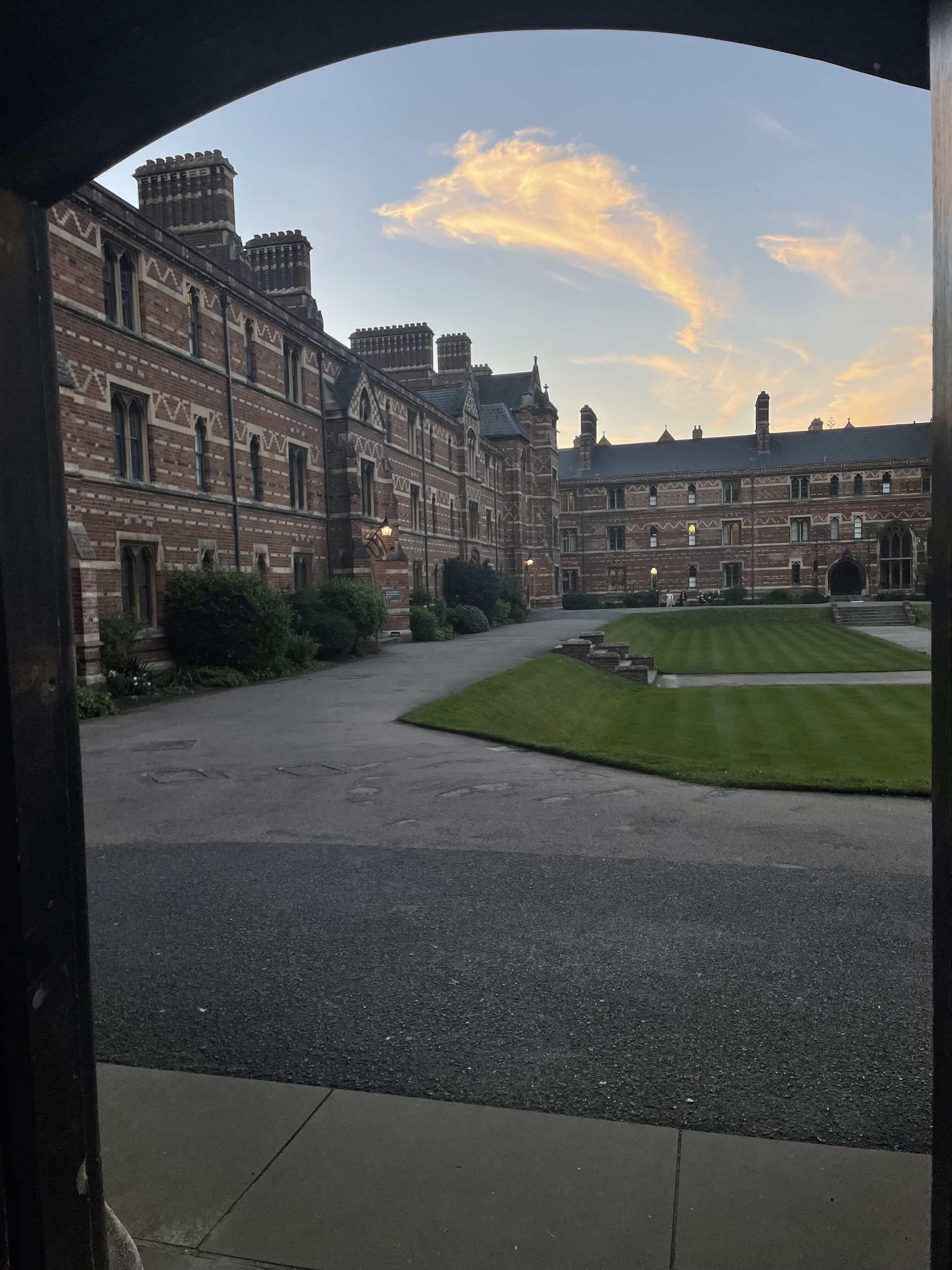



Likes
- Faculty- To begin with, the department's faculty provides us with remarkable lectures. If we start with the online classes, we study from modules curated by our professors every semester. These modules are a blend of lectures and tasks hailing from practical experiments, refraining the lectures from becoming mundane. During the physical classes at Oxford, I realised how education could be imparted without having biases and rigidities regarding the correctness of a concept. To elaborate, in our class, no answer was wrong; it was always a different perception but not wrong. Furthermore, the lectures were usually not about theories but about the practical application of concepts that would help us become better writers.
- Cohort size- The size of the cohorts genuinely varies but does not cross 20 students and we had 4 cohorts in our batch. Particularly in my cohort, there are 14-15 students, making the entire course extremely close-knit. We not only interacted outside the course but also had a space to discuss everything we learnt. During the time we met, we spent most of the time together as a cohort, which brings me to my next point on networking.
- Networking opportunity- However, most of the networking was indeed done when we met for the course in July, the way the course is structured also provides countless networking opportunities. Let me explain: during the weekly tasks that we complete online, every student is repeatedly motivated to read and comment on the work of other students. This results in gaining different perspectives, and finding a safe space for interaction with peers.
Dislikes
- Leave structure- Even though the course is mindful of students working alongside the course, there are only two breaks given to the students- one after the first year ends and one during the Christmas holidays. The rest of the year, the students have to do weekly units with tasks and assignments after the end of the entire module, making the course slightly on the hectic side.
- Future help- As students usually enrol in such courses with the expectation of receiving resources such as agents and jobs, the availability of those is bleak. Even though one can connect with the tutors and ask for such materials, they are not formally provided. Furthermore, job and placement actively take place but as a student of a blended course without a visa, it is extremely unlikely to secure one with ease.
- Alumni network- Even though the University of Oxford has robust alumni, there is a lack of a platform for students to connect with these alumni. Better opportunities can be provided where students get easy access to the contacts in order to increase their network.
Scholarship
- I did not receive any scholarships, but there are scholarships and student finance options available. However, student finance usually covers students from the UK itself.
- One of my batchmates received a student finance which was basically a loan for one year at Oxford.
- When it comes to international students, they are more likely to secure a scholarship from the home government as the scholarship options for international students for the particular course are bleak.


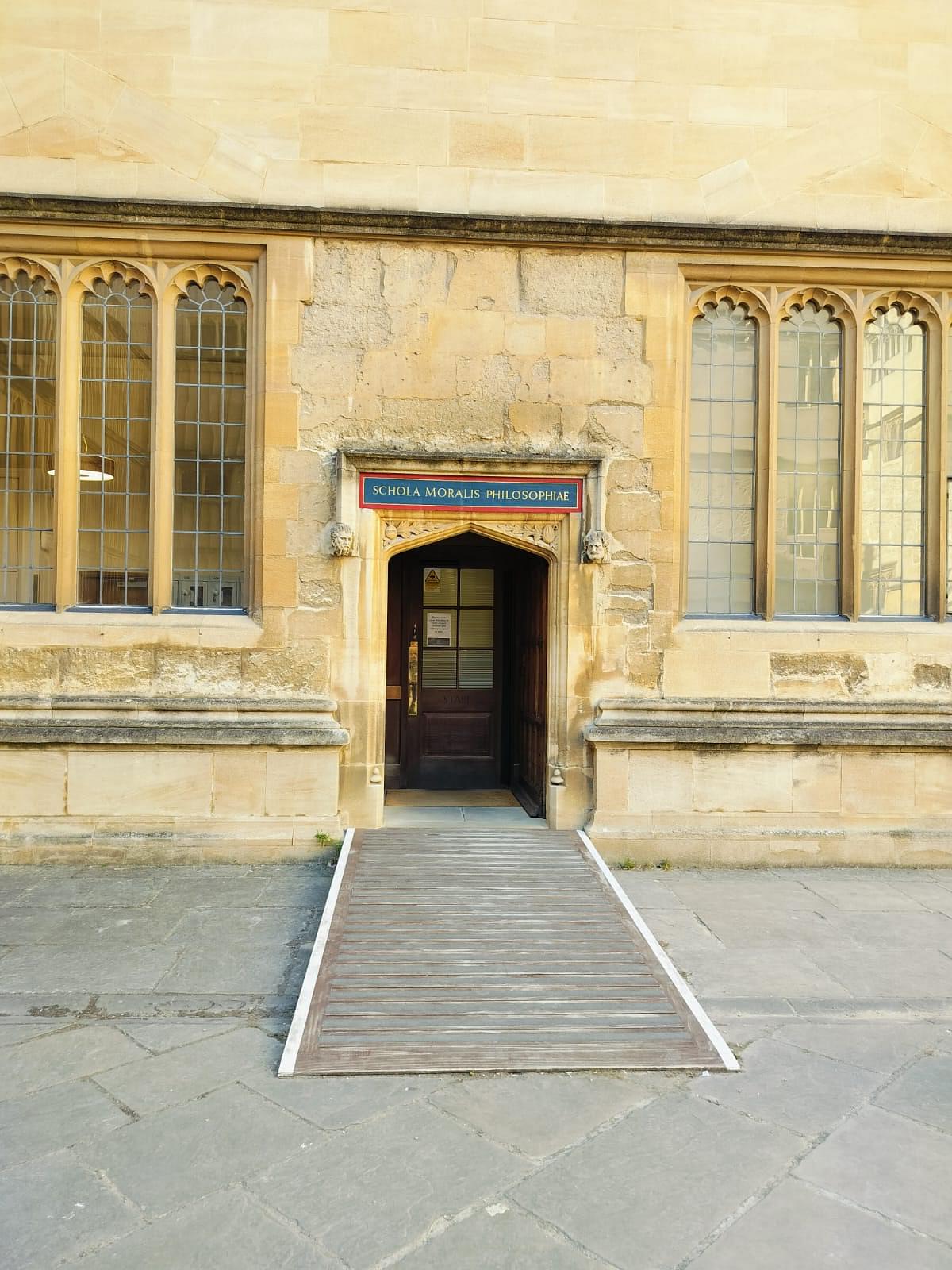



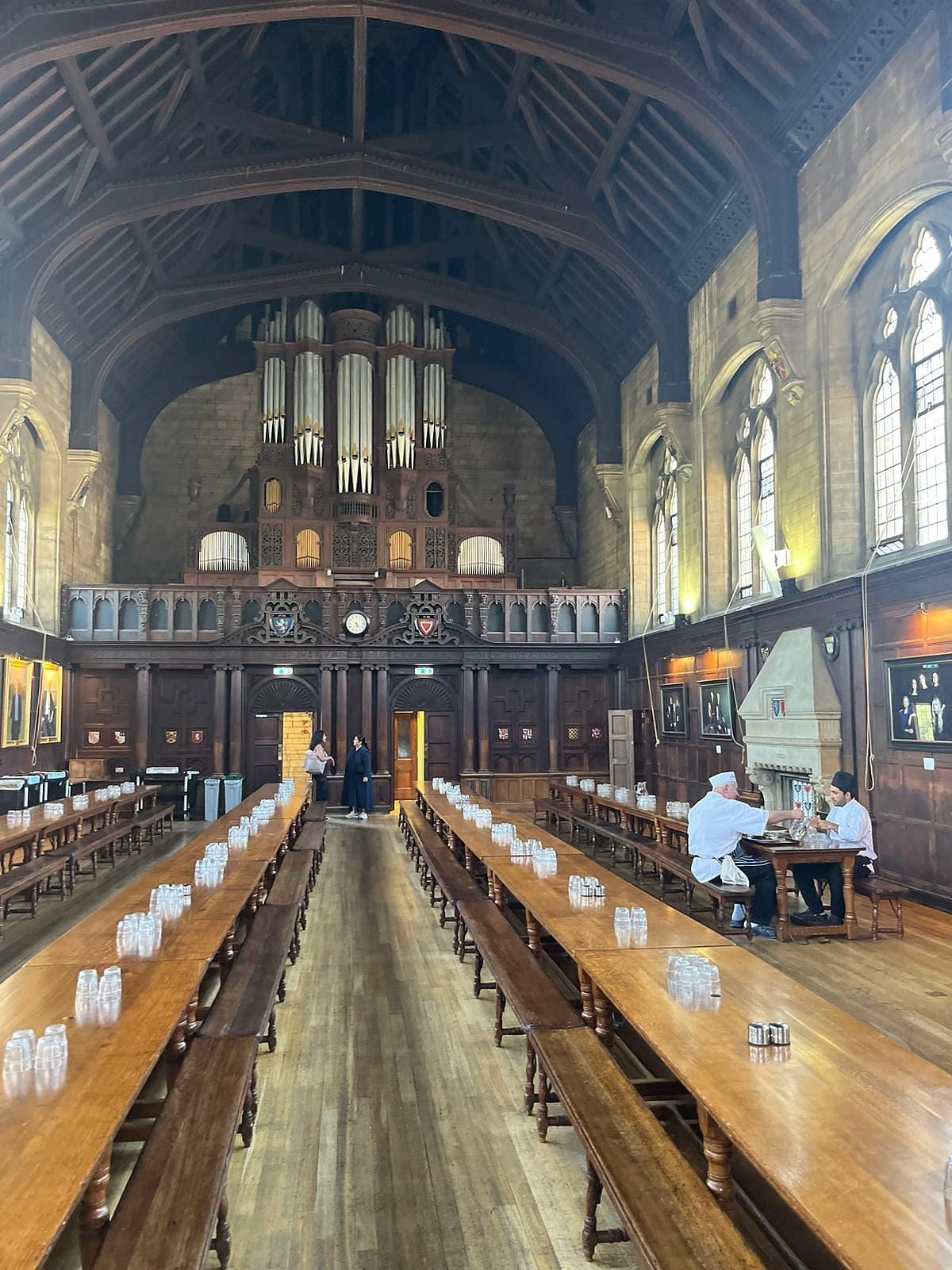

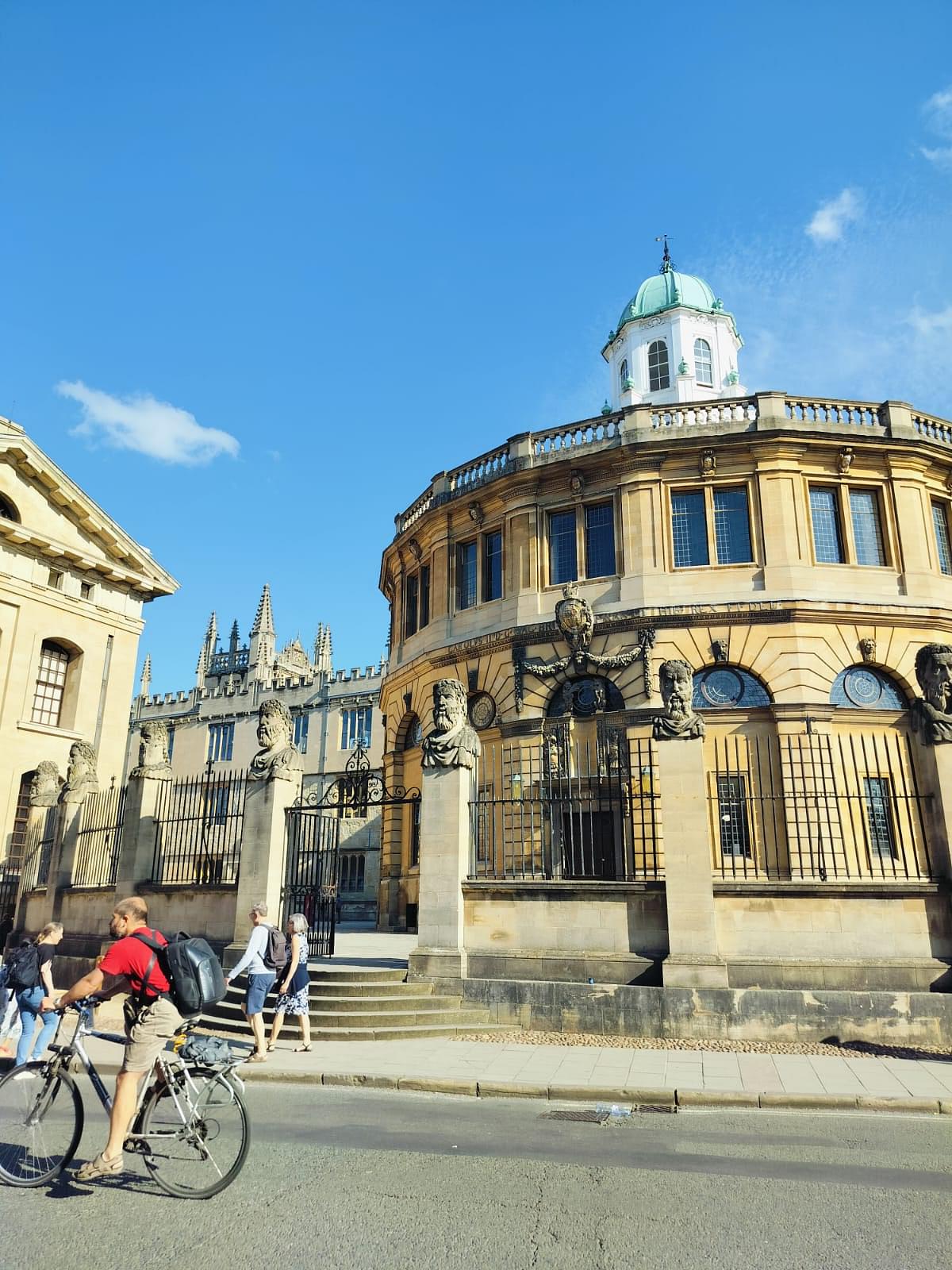
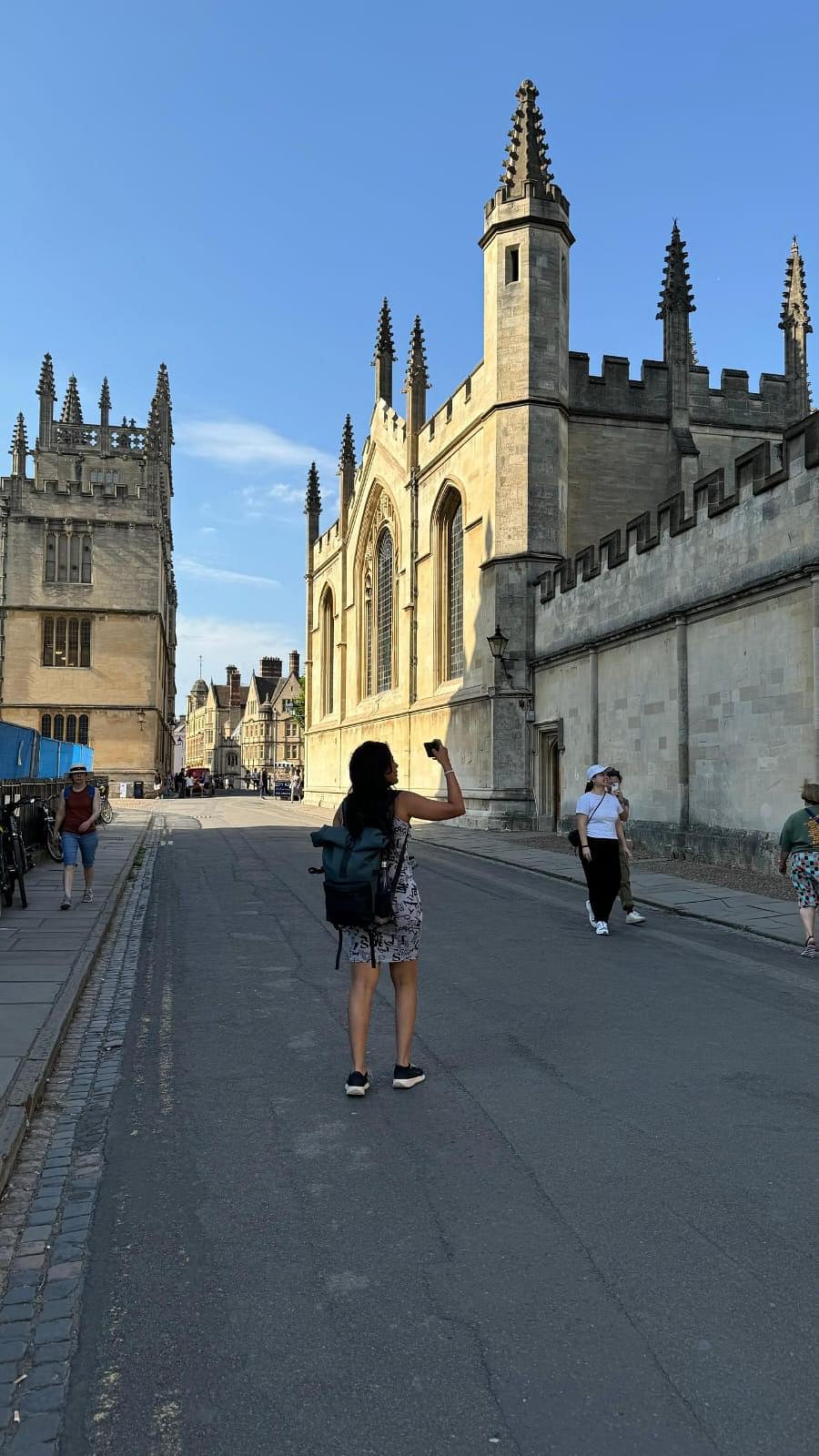
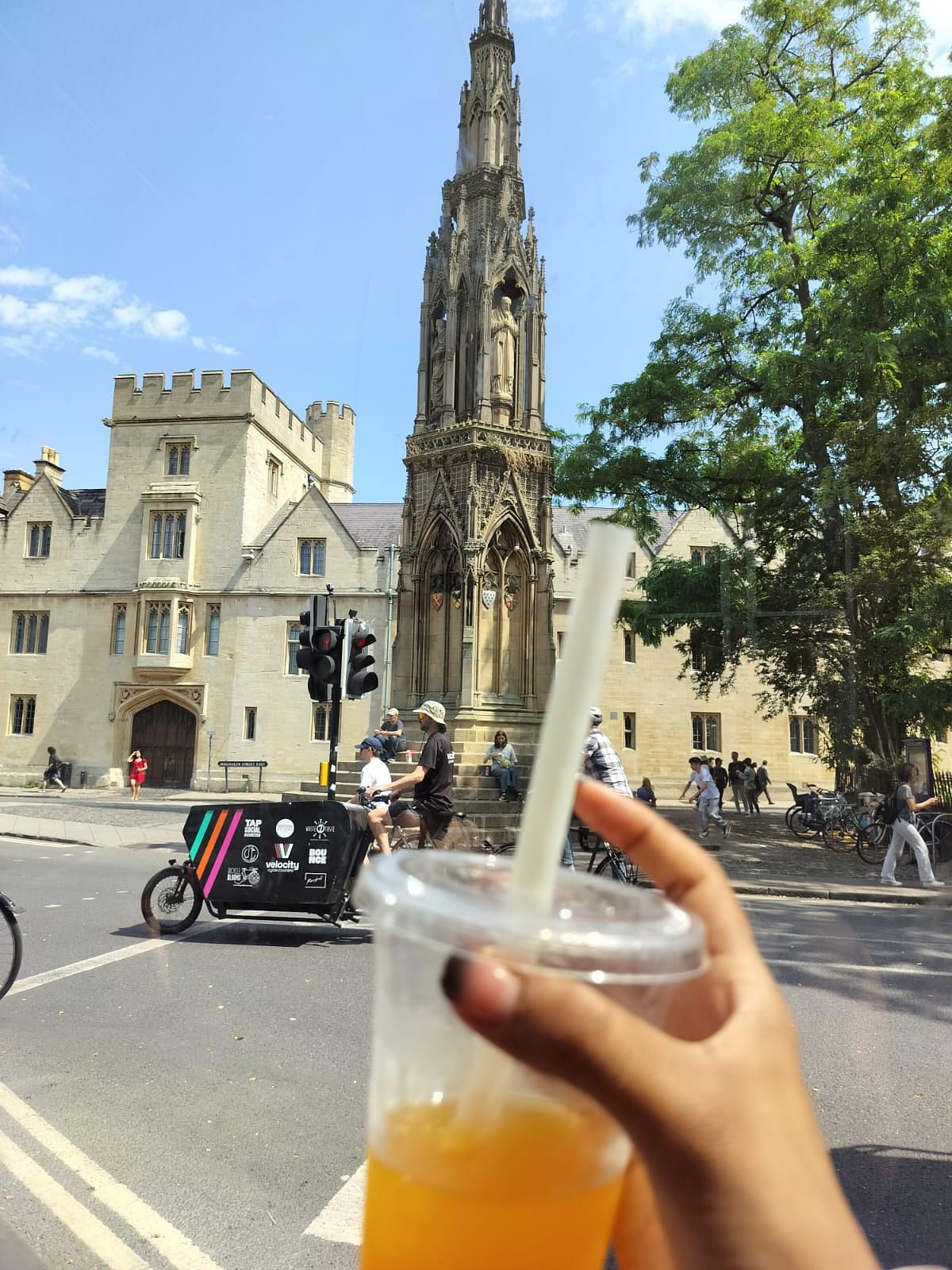
Likes
- I get to take courses only in my major which enables me to specialize early on.
- Bachelor's degree is awarded in 3 years with an optional masters in the 4th year which means I save a lot of money and can start working sooner with more qualifications.
- One on one tutorials two to three times a week with professors who have a lot of research experience enables me to learn the course material in greater depth.
Dislikes
- Unable to take courses outside my major but I chose Oxford specifically because I was sure I wanted to do only Computer Science in college.
- Sports facilities are decent but because everybody is academically focused there is not much investment in the sports teams.
- No investment in the infrastructure and most of the laboratory buildings and even the CS department has outdated infra that should be upgraded considering the amount of money they receive.
Scholarship
- There are no scholarships or financial aid available for any international students in the UK.
- The only bursaries and need-based financial aid is available for UK citizens.
- There are no merit scholarships and the only one that used to exist for IMO Gold Medallists was removed this year. Hence it is important to be able to cover all your expenses on your own.
Likes
- It is a renowned university. I liked the tutorial system - groups of 2-4 students being taught by a professor after the main lectures. I chose maths because it always felt natural and enjoyable to me.
- The course material, the gothic architecture, department facilities, the area, the food.
Dislikes
- The accommodation and its facilities, wifi, and the fact that the course is not as engaging as it could be (e.g. with more projects, in-person presentations, group activities)
Overview
The terms are fast-paced and highly academic. Even though sometimes the academic load can get high, it was always manageable for me. The problem sheets favor quality over quantity. As for other social activities, there are lots of opportunities to join clubs and societies, little social events in your college and also your subject department. Lots of talks and workshops. We have formal dinners every now and then where you dress up. The exams are also traditionally taken and you must wear formal clothing.
Scholarship
No
Likes
- Prestige and great faculty along. Additionally, Oxford University is very different from any university in terms of culture.
- The friends/classmates, the city, the buildings/infrastructure, the accommodation.
Dislikes
- The Admin, the weather.
Overview
Admin is not really great, it is not very systematic. But otherwise you meet a lot of smart people. I never thought I would enjoy going for debates but we have many debates at the Oxford Union where esteemed speakers from around the world come to exchange thoughts and ideas. The formal dinners let you explore the different colleges across Oxford University. There is almost no medical help available unless it is fatal so carry medicines/bandages etc.
Scholarship
nope
Overview
The candidates need to pass IELTS with a minimum score of 7 and minimum 100 in TOEFL. You apply through UCAS, as for any other university. The full information is contained in the University's Undergraduate Prospectus.To become a student at Oxford you need to be accepted by a particular college, though you apply through a central admissions system. If you don't know which college to name as your preference you can make an open application: details of this are also in the undergraduate prospectus. Candidates are shortlisted for interview on the basis of their academic record and promise, as detailed in the selection criteria. Interviews take place in December.
Overview
I chose Oxford University for obvious reasons as it is top-ranked, and I needed foreign accreditation to progress in my teaching career. Plus, it was a distance learning program so I was able to study while I worked. It also had a residential module which gave me an opportunity to meet my peers from all over the world. Also, since the ratio of instructors to students is very low. Only 13 fellows were admitted each year, making it easy for professors to give individual attention to each student.
Scholarship
No, I didn't receive any scholarship.
Overview
Oxford is best for my chosen course. It is one of the only courses in the world that lets students gain practical experience in micromanipulation, in vitro maturation and embryo biopsy.
Scholarship
No
Overview
Because University of Oxford is one of the best university in the world, always top 10 in almost all university ranking website and Oxford also has a lot to offer to students
Scholarship
Yes, I got scholarship from Indonesian Endowment Fund for Education which is 15,300 pounds/ year + tuition fee + visa + transport + seminar and conferences + thesis + paper publication and research fee.
















Comments